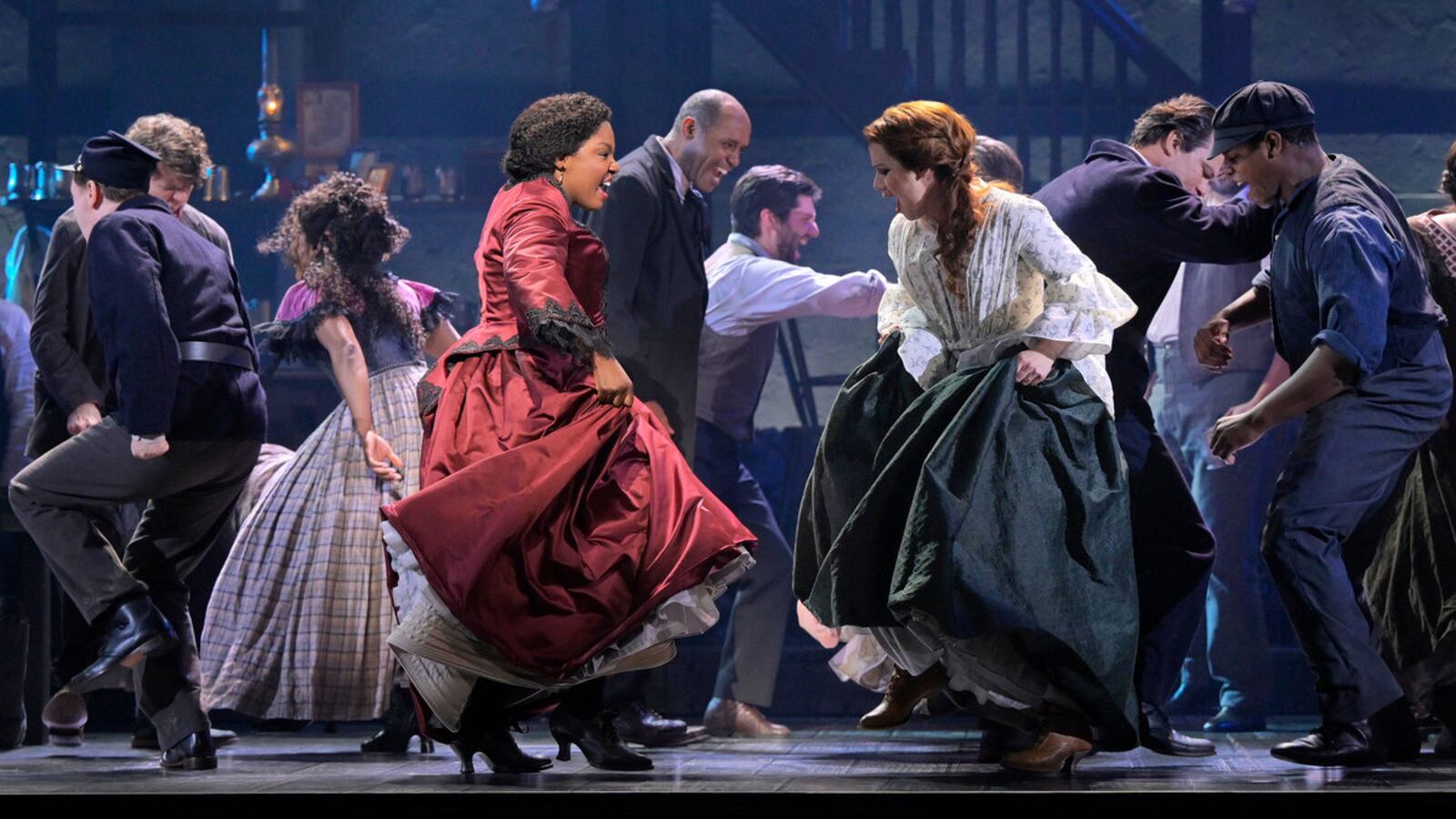The beginning of the Broadway musical Paradise Square, which opens Sunday night at the Ethel Barrymore Theatre (tickets on sale through Nov. 23) shows us the modern-day intersection of streets in the Five Points neighborhood where the action takes place. And then in a flash, it is New York 1863, and the bar run by Nellie O’Brien (Joaquina Kalukango, excellent), which welcomes in its inclusive walls free Blacks and Irish immigrants.
Nellie herself is in a mixed marriage, with Irish American Willie O’Brien (Matt Bogart), and runs the bar with the help of her sister-in-law Annie (Chilina Kenndy), who herself is married to the Black Reverend Samuel Jacob Lewis (Nathaniel Stampley). The Civil War is raging, and President Lincoln’s federal draft will ultimately be the keg for the New York Draft Riots of July 1863.
What makes the show, directed by Moises Kaufman, so current is the villainous presence of New York politician Frederic Tiggens (John Dossett), who is worried by the alliances and potential power of two minorities coming together, and formulates a number of despicable schemes to wreck the bar, and the semblance of a multi-cultural community within. In Tiggens, we see Donald Trump and all his discontents down through history—right down to the casual betrayal of the angry and disaffected voters whose support he courts to gain power.
That isn’t everything: There is also a runaway slave, Washington Henry (Sidney DuPont); his true love whom he has become separated from, Angelina Baker (Gabrielle McLinton); an Irish nephew dreaming of New York riches, Owen (A.J. Shively), another Irishman badly injured during wartime battle. Jacob Fishel plays a pianist called Milton Moore, who seems an arty drunk and sweet, but whose ignorance and big mouth sets off an awful chain of events, leading to the destruction of community.
The stories on the complicated, jumbled, and overcrowded set do intersect, but what resonates most acutely today is how those in power seek to turn the marginalized against each other in order to maintain power.
The plotting of the stories is a miasma. They stop and start, and develop in rushed coda at the ends of bombastic music and dizzying dance. Songs restate plot and thoughts, without moving anything forward. Dance is central to the musical—as you would expect by anything choreographed by Bill T. Jones—but the Irish dancing in particular seems to be used as padding, as does a dance contest that only gets underway after more competitive dancing. When Irish and Black styles of dancing meet, something electric does happen on stage. But after a while, energetic as it is, the dancing just has nowhere to go, except more dancing. Can you have too much dancing? Sorry, yes. In Paradise Square, it just keeps happening and repeating.

One funny line comes from Owen: When the time for the contest—to save the bar!—arrives, he says under his breath, disconsolately, that he has already danced that night. Annie is supposed to be fierce, but her fierceness is too bug-eyed and bonkers. At least she is one of the “good” characters with some grit in her desire to survive. Everyone else is so worthy against whatever dark schemes and awful words are leveled against them. Do good characters have to be this unimpeachably good?
The repetitiveness and why-are-we-doing this again? nature of the dancing is mirrored in what the characters express to us. We don’t see Washington and Angelina as a couple for long enough to care as they wander around the stage not connecting for a long time. However, one of the evening’s beautiful moments and songs follows Angelina’s journey from plantation to liberation, with a lesbian couple foregrounded in that escape. Their presence reminds you of the very human, individual histories so often lost in the grand sweep of history—and the hidden histories of the marginalized, which Paradise Square might have benefited from making even more part of a differently plotted story.
The mechanics of the show work against it. It’s far too long. But then, just when you wish it would move itself forward or end, it serves Kalukango’s astonishing late song, “Let It Burn.” The show doesn’t have long to go, but this song stops it—quite right—dead in its tracks.
Kalukango herself has the most difficult job on stage—keeping this unwieldy ship upright, and she does it with an embracing strength, power, and presence. The end of the story is the end of the neighborhood, but what Kalukango makes clear is that the spirit of resistance and determination to assert space and pride remain. It’s the right message in a show of bizarrely clashing registers. However, the idealization of how we should live alongside each other is not reflected in our past or our present, and so Paradise Square sends us out with the kind of love-each-other-and-ourselves pat on the head that the majority of any Broadway audience would likely subscribe to, but which history—including the one in the show!—constantly proves far too brutal to accommodate.
Most frustratingly, most basically, after nearly three hours on stage, there is no revenge on the appalling Tiggens. The point, I guess, is that this is how odious people like him maintain power, but this is a Broadway musical. And that character deserves either a proper verbal climactic takedown or a satisfying biff on the nose. But no such payoff ever happens—and so it is that the frustrations of Paradise Square hum long in the mind afterward.







